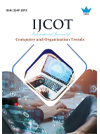Conception of Electricity as Determinant of Podcast Adoption in Nigeria Educational Systems
Citation
MLA Style:Adu Emmanuel Ifedayo, Azidah Abu Ziden, Aziah Binti Ismail "Conception of Electricity as Determinant of Podcast Adoption in Nigeria Educational Systems" International Journal of Computer and Organization Trends 9.5 (2019): 10-12.
APA Style:Adu Emmanuel Ifedayo, Azidah Abu Ziden, Aziah Binti Ismail. Conception of Electricity as Determinant of Podcast Adoption in Nigeria Educational Systems. International Journal of Computer and Organization Trends, 9(5), 10-12.
Abstract
This research conceptualises ideas on electricity as a determinant of podcast adoption in Nigeria educational system. Although, the Federal Government of Nigeria (FGN) is making efforts towards the improvement of electricity in Nigeria educational system. Notwithstanding, presently electricity outage is still frequent within Nigeria educational system. This implies that more effort is required towards the improvement of electricity. This research conceptualises some of the issues militating against electricity. The conceptual approach was necessary to theoretically demonstrate how electricity is a determinant of podcast adoption in Nigeria educational system. Hence, the researchers’ adopted and adapted a theory of electricity transmission from a developed country to adequately conceptualise electricity as a determinant of podcast adoption. Thus,relevant conclusion and recommendation were made based on this study findings.
References
[1] Abiola, A. O. & Ikegune D.O. (2016). Computer Self-efficacy and Perceived ease-of-use ofPersonal Digital Assistants for Academic activities by Undergraduates in University of Ibadan.
[2] Adetimirin, A. E. (2012). ICT literacy among undergraduates in Nigerian universities.Education and Information Technologies, 17(4), 381-397.
[3] AER & NEEDP (2007). Energy kids page. Electricity - A secondary energy source. Retrievedfrom http://www.ei.lehigh.edu/learners/energy/readings/electricity.pdf on 23/8/19.
[4] Akande, S. O. (2011). Computer and internet facilities use in distance education: a survey ofsandwich students of university of Ado-Ekiti, Nigeria.
[5] Chigbu, E. D., John-Okeke, R., & Omekwu, C. O. (2016). Corporate social responsibility: Challenges of implementing MTN digital libraries in Nigerian universities. Library Philosophy and Practice.
[6] NEED (2018). Electricity. The NEED project. Secondary Energy Info Book. Retrieved fromwww.need.org on 23/08/19.
[7] Ojeniyi, A. O., & Adetimirin, A. E. (2016). ICT literacy skills and electronic informationresources use by lecturers in two private universities in Oyo State, Nigeria.
[8] Onyam, I. D., & Akpom, C. C. (2016). Digital Nervous System: A Strategy for EnhancedManagement and Service Delivery in Federal University Libraries in South-East Nigeria. Library Philosophy and Practice, 1.
[9] Orike, S., & Ahiakwo, C. O. (2009). A sustainable model for information and communicationtechnology in Nigeria`s tertiary educational transformation. In Adaptive Science & Technology, 2009. ICAST 2009. 2nd International Conference on (pp. 204-210). IEEE.
[10] Stork, M. J., Karageorghis, C. I., & Ginis, K. A. M. (2019). Let’s Go! Psychological,psychophysical, and physiological effects of music during sprint interval exercise. Psychology of Sport and Exercise, 101547.
[11] Yaman, I. (2016). The potential benefits of podcasts for language learning. Journal ofEducation and Instructional Studies in the World, 6(2016), 60-66.
Keywords
Electricity, Determinant, Podcast, Nigeria, Educational.



